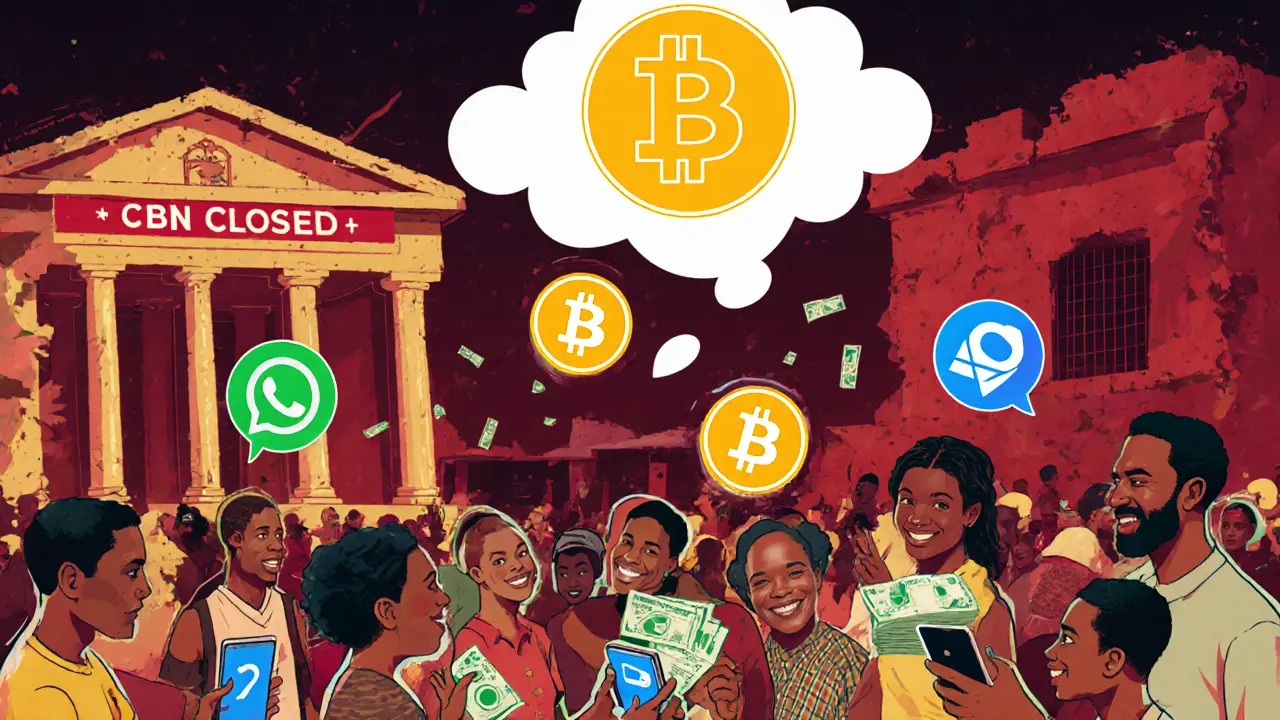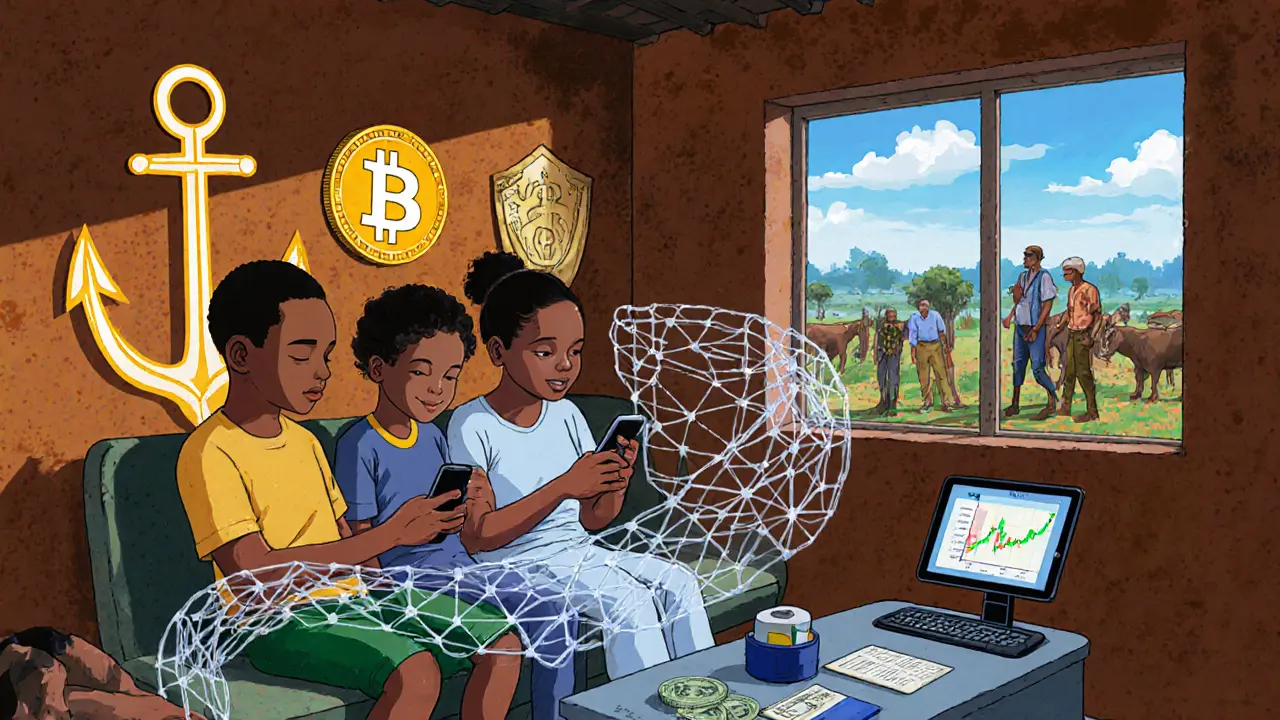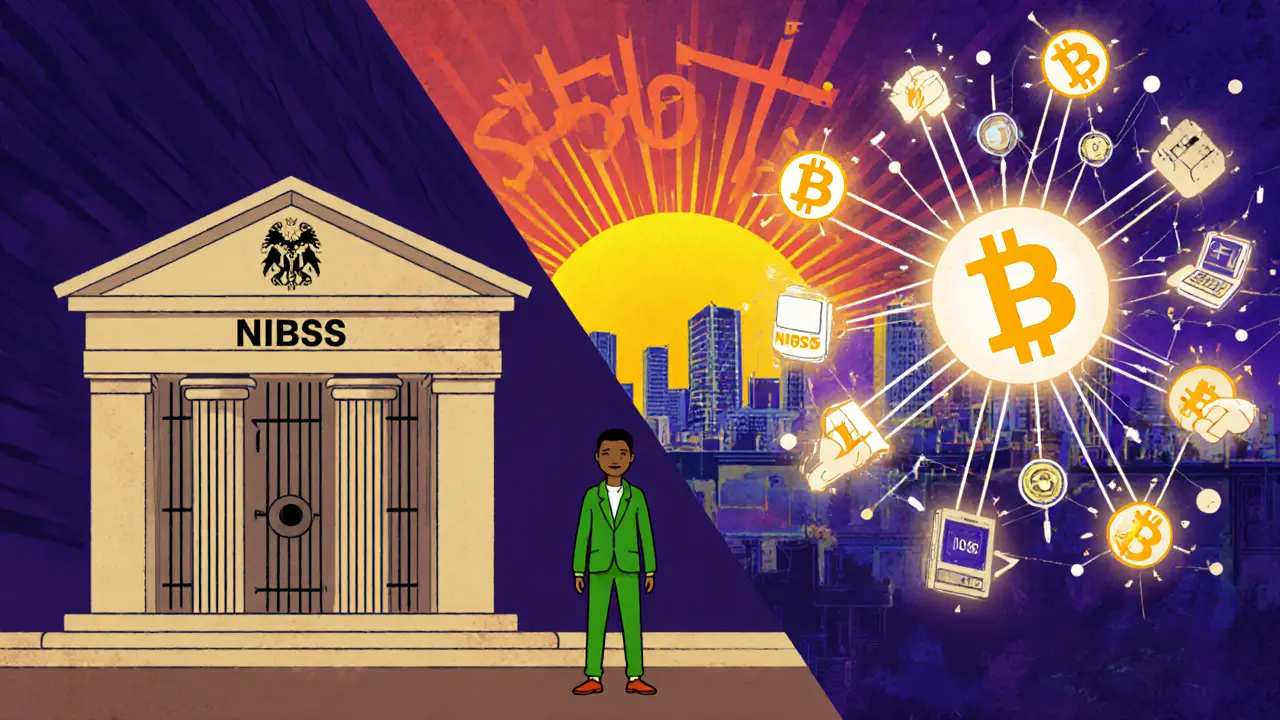Why Nigeria Leads the World in Peer-to-Peer Crypto Adoption
 Oct, 11 2025
Oct, 11 2025
Nigeria P2P Remittance Cost Calculator
Send money from Nigeria to any country? Calculate how much you save using P2P crypto versus traditional remittance services. Based on current rates in Nigeria's grassroots crypto economy.
Cost Comparison
Traditional Remittance
Western Union, MoneyGram
Fee:
Total Cost:
P2P Crypto
Bitcoin, USDT on Binance/Paxful
Fee:
Total Cost:
Nigeria ranks top in global P2P crypto adoption
While countries like the United States and Singapore focus on regulated exchanges and institutional crypto products, Nigeria has built something far more powerful: a grassroots, people-powered crypto economy that runs outside the traditional banking system. In 2025, Nigerians traded over $59 billion in peer-to-peer (P2P) cryptocurrency - more than most developed nations. This isn’t a trend. It’s a survival strategy.
It started because the banks wouldn’t let them. In 2017, the Central Bank of Nigeria (CBN) ordered commercial banks to cut off services to crypto businesses. The goal? To stop what they saw as risky, unregulated activity. Instead, it forced millions of Nigerians to build their own financial infrastructure. They didn’t wait for permission. They didn’t lobby for change. They just started trading directly with each other - naira for Bitcoin, Bitcoin for USDT, USDT for dollars - using WhatsApp, Telegram, and apps like Paxful and Binance P2P.
By 2020, Nigeria was already the third-largest crypto market in the world by volume. Today, it’s consistently in the top five globally, depending on the report. Chainalysis ranked it sixth in September 2025. Cornell Business put it second. The numbers don’t lie. What matters isn’t the exact rank - it’s the fact that a country with over 36% of its adult population unbanked, inflation hitting 24%, and a currency that’s lost 75% of its value against the dollar since 2016, found a way to bypass the system that failed it.
Why P2P? Because the banks wouldn’t help
Traditional banking in Nigeria is broken for most people. Sending money abroad through Western Union or MoneyGram costs up to 8% in fees. It takes days. Sometimes, the money just disappears. For a Nigerian worker sending $200 home to family in Enugu, that’s $16 gone. With P2P crypto, they can send the same amount in minutes for less than $2 - often free.
And it’s not just remittances. Small businesses use crypto to pay for imports. A Lagos-based fashion designer buys fabric from Turkey using USDT. A software developer in Abuja gets paid in Bitcoin from a client in Germany. A student in Port Harcourt uses crypto to pay for online courses on Udemy or Coursera. None of this would be possible if banks still blocked crypto transactions.
The CBN lifted its ban in late 2023 - not because they changed their mind, but because they couldn’t stop it. The system had already moved on. Now, licensed exchanges like Quidax, Patricia, and Luno operate openly. They’re integrated with Nigeria’s interbank settlement system (NIBSS). But here’s the twist: even with this new legitimacy, P2P trading still dominates. Why? Because it’s faster, cheaper, and doesn’t require paperwork.

Bitcoin isn’t the only coin - but it’s the most trusted
People don’t trade just any cryptocurrency. Bitcoin is the default. It’s the digital dollar. USDT (Tether) is second - a stablecoin pegged to the U.S. dollar that lets people hold value without watching their savings evaporate overnight. Dash and Ripple are used too, but mostly for specific use cases. Bitcoin is the anchor.
Why Bitcoin? Because it’s decentralized. No bank can freeze it. No government can devalue it. And unlike local Ponzi schemes like MMM or OneCoin that ruined trust in the early 2010s, Bitcoin’s code is open. Anyone can verify the blockchain. Nigerians learned the hard way that “crypto” doesn’t mean “get rich quick.” They now know the difference between a scam and a tool.
Today, crypto education is everywhere. YouTube channels like “Crypto Nigeria” and “Naija Crypto Talk” have millions of views. Telegram groups offer 24/7 support. Local meetups in Ibadan, Kano, and Abuja teach new users how to set up wallets, use two-factor authentication, and avoid phishing scams. The learning curve is real - most people take 2 to 4 weeks to feel comfortable. But once they do, they never go back.
The numbers don’t lie: 22 million users by 2025
By 2025, an estimated 22 million Nigerians - about 10% of the total population - will be using cryptocurrency regularly. That’s more than the entire population of Sweden. And it’s not just young people. Farmers in Katsina use crypto to sell crops to buyers in Lagos. Market women in Onitsha keep savings in USDT because their local bank’s interest rate is negative after inflation.
The fintech boom in Nigeria is built on this foundation. Moniepoint, a payments startup that lets small merchants accept digital payments, became a unicorn worth $1 billion in 2025 - backed by Google. That’s not a coincidence. It’s the result of a population that’s already comfortable with digital money.
The Investments and Securities Act of 2025 made crypto a regulated financial asset in Nigeria. Digital tokens are now legally recognized as securities. That’s huge. But here’s what’s even more important: the law didn’t kill P2P. It gave it legitimacy. Now, you can trade crypto on licensed platforms and still use P2P to move money - both are legal.

What’s next? A hybrid system is forming
Nigeria isn’t choosing between crypto and the bank. It’s building a third path. The Nigeria Inter-Bank Settlement System (NIBSS) now works with Zone’s blockchain network to settle interbank transfers faster and cheaper. That’s the government using crypto tech to fix its own system.
Meanwhile, the P2P networks keep growing. People still prefer direct trades because they’re instant and don’t require ID verification every time. Some platforms now offer “P2P + bank” options - you can buy crypto with a bank transfer, then instantly sell it to someone else via P2P. The lines are blurring.
Experts say Nigeria’s model could become the blueprint for other countries. In Argentina, Venezuela, and Kenya, people are watching closely. They’re seeing how Nigerians turned financial repression into innovation.
It’s not perfect - but it works
There are risks. Scammers still exist. Price swings can wipe out savings if you don’t understand volatility. Some P2P platforms have poor customer support. And there’s always the fear that the government could reverse course again - especially if international pressure mounts over money laundering concerns.
But for millions of Nigerians, the cost of doing nothing is worse. If you’re unbanked, or underbanked, or tired of watching your money lose value every month, crypto isn’t a luxury. It’s a necessity. And P2P trading? It’s the most reliable way to get there.
There’s no central authority telling people what to do. No regulator deciding if you can save in dollars. Just people trading with people - across neighborhoods, cities, and continents - using code, not banks.
Nigeria didn’t get here by luck. It got here because it had no other choice. And that’s why it leads the world.
Why is Nigeria #1 in P2P crypto trading?
Nigeria leads because its traditional banking system failed to serve most of its population. With inflation over 24%, a currency that lost 75% of its value since 2016, and banks blocking crypto transactions until 2023, Nigerians built their own financial network. P2P crypto offered a way to send money abroad, save in dollars, and run businesses without banks. The result? Over $59 billion in crypto trades in just one year.
Is crypto legal in Nigeria?
Yes. The Central Bank of Nigeria lifted its 2017 ban on banks servicing crypto businesses in late 2023. The Investments and Securities Act of 2025 formally recognizes digital assets as financial securities. Licensed exchanges like Quidax and Patricia operate legally. P2P trading is not only legal - it’s the most common way Nigerians use crypto.
What’s the most popular crypto in Nigeria?
Bitcoin is the most trusted and widely traded. It’s seen as digital gold - a store of value that can’t be devalued by the government. USDT (Tether) is second, used as a stable digital dollar for everyday transactions. Dash and Ripple are used too, but mostly for specific needs like fast payments or cross-border trade.
How do Nigerians start using P2P crypto?
Most start by downloading a P2P app like Binance or Paxful. They verify their ID, link a bank account, and buy Bitcoin or USDT with naira. Then they learn to trade directly with others - buying from someone who accepts cash deposit, selling to someone who pays via bank transfer. Community groups on WhatsApp and Telegram offer free help. It takes 2-4 weeks to get comfortable.
Can P2P crypto replace banks in Nigeria?
It’s not replacing banks - it’s bypassing them. Most Nigerians still use banks for salaries and bills. But for saving, sending money abroad, and accessing foreign goods, crypto is often the only option that works. The future is hybrid: regulated exchanges for compliance, P2P for speed and freedom. Together, they’re creating a financial system that actually serves people.